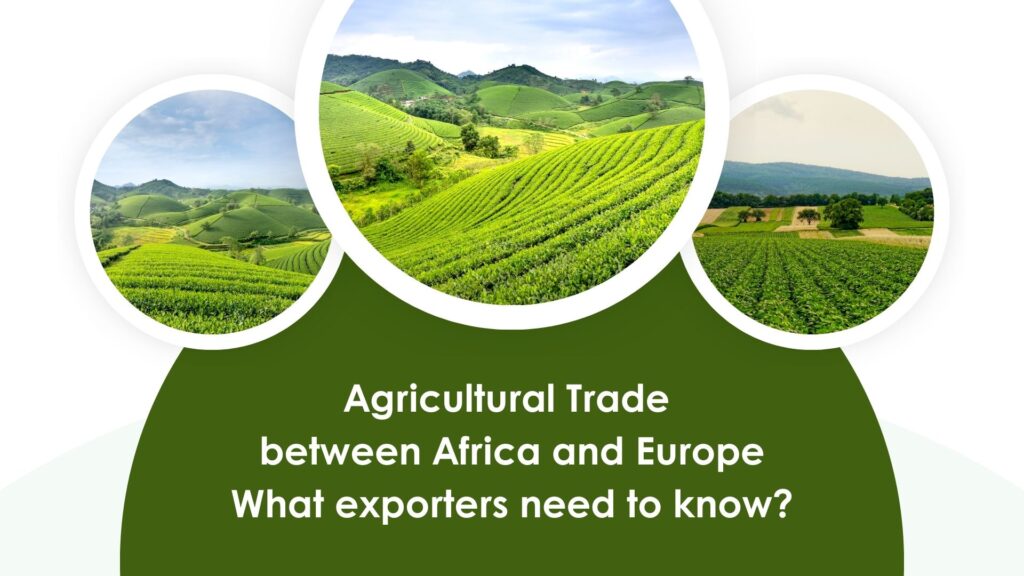One of the most significant links in global trade is the exchange of agricultural goods between Africa and Europe. This trade helps food supply chains, boosts economies, and gives exporters new chances. Shipping agricultural goods across continents is more than just moving them from one place to another. It also needs careful planning, following international rules, and knowing how to handle perishable items. In this article, we explain the top 5 things to know before exporting agricultural goods from Africa to Europe. Exporters must manage a variety of tasks to ensure their goods arrive at their destination fresh and safe. These things include temperature-controlled storage, customs paperwork, and phytosanitary standards. In a very competitive export industry, knowing these important requirements for agricultural goods exporting not only lowers risks and delays but also increases profits.
1. Exporting food from Africa to Europe: Knowing the Rules and Standards of the EU
To send agricultural goods to Europe, you need to know the EU’s rigorous rules very well. The General Food Law (Regulation (EC) No. 178/2002) sets the standard for food safety by making sure that items can be traced and are safe for people to eat. If exporters want to sell to organic markets, they also have to observe tight standards about pesticide residue (Regulation (EC) No 396/2005) and organic certification (Regulation (EU) 2018/848). These requirements are in place to protect the health of consumers. Following the rules is more than just avoiding fines; it also builds trust with customers, lowers the cost of rejected shipments, and guarantees long-term success. The EU puts quality, sustainability, and environmental responsibility ahead of safety. Exporters must set up reliable monitoring systems across the supply chain to meet these standards.
2. Getting good at cold chain logistics.
Fruits, vegetables, and flowers that are fresh must be stored at certain temperatures from the farm to the delivery. Cold chain management includes properly pre-cooling after harvest, storing in a refrigerator, and shipping in containers that keep the right temperature. Even small temperature changes can lower the quality of a product and cause losses. Exporters need to work with logistics partners who can monitor the temperature in real time, package items in insulated boxes, and handle them quickly during delivery. A strong cold chain keeps things fresh and makes buyers more confident that their goods will arrive in Europe in great form.
3. Dealing with papers and certifications
Agricultural exports need much documentation. Exporters need to get phytosanitary certifications from the agrarian authorities in the country they are exporting from. These certifications show that the commodities are free of pests and diseases. Export licenses, customs declarations, bills of lading, and certificates of origin are other crucial papers. Organic or fair trade products need extra certificates. Missing or incorrect paperwork can cause long waits at European ports, which can raise storage costs and put products at risk of rotting. If you work with customs brokers or freight forwarders who know EU law and have a standard way of doing paperwork, you can avoid making mistakes that cost a lot of money.

4. Following Food Safety and Phytosanitary Rules
The EU cares a lot about plant health and food safety. To keep harmful pests and illnesses from getting into European markets, phytosanitary inspections are needed. Exporters must make sure that their goods meet the standards set by both EU import legislation and local agriculture authorities. Also, food safety methods like Hazard Analysis and Critical Control Points (HACCP) should be used in the production and supply chains. Good agricultural practices (GAP) and the right packaging remove hazards and make sure that products not only satisfy regulatory standards but also stay competitive in the market.
5. Choosing the Best Shipping and Logistics Partners
For exports to go well, you need logistics partners you can trust. Exporters should pick carriers and freight forwarders who have worked with agricultural trade between Africa and Europe before. For perishable goods, consolidation, warehousing, real-time tracking, and quick customs clearance are all very important services. Geedlaal Logistics, being one of the advanced logistics companies, also offers digital tracking solutions that give exporters and buyers a full view of the whole supply chain. Long-term contracts with reliable logistics companies like Geedlaal Logistics lower risks, speed up delivery times, and ensure that sensitive materials are handled safely.
In conclusion
Moving farm goods between Africa and Europe is a huge potential, but it also comes with unique issues that exporters can’t ignore. To be successful, you need to know how to handle cold chain logistics, follow strict EU rules, and make sure that all the paperwork is proper at every stage of the process. By working with reliable logistics companies like Geedlaal Logistics and spending money on digital tracking systems, exporters may cut down on losses, keep the quality of their products, and make trade ties stronger. As more people in Europe want fresh African food, exporters who put efficiency, transparency, and compliance first will stay competitive in this burgeoning agricultural trade corridor. If you are searching for the best logistics company in Netherlands, Geedlaal Logistics is the ideal choice. Changes in cargo shipping are no longer optional — it’s essential for staying competitive in a fast-changing global trade environment. From real-time visibility to AI-powered decision-making, technology is turning traditional shipping into a smarter, faster, and greener industry. Businesses that adopt these innovations will benefit from improved efficiency, lower costs, and a stronger customer experience.

